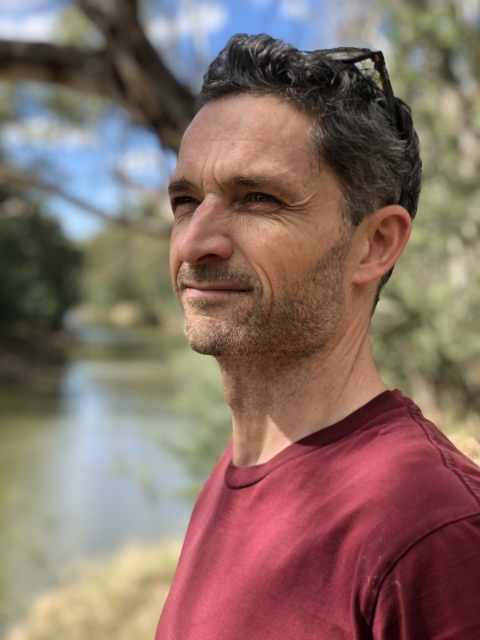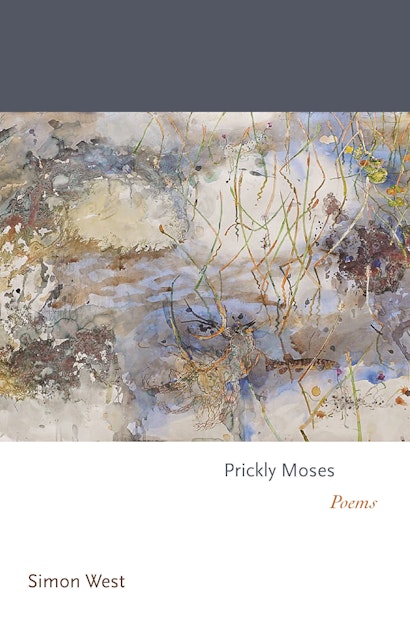An uncanny blend of the external and the intimate has been a hallmark of Simon West’s poetry for nearly twenty years. In this new collection, the Australian poet and Italianist delights in the transforming and endlessly varied powers of naming and speaking. West’s intensely regional focus stands in dialogue with Europe and antiquity. Landscapes reveal the tangle of their historical dimensions, as the rivers of both the Goulburn Valley in southeastern Australia and the Po Valley in northern Italy merge and flow into the wider currents of the Southern Ocean. Again and again, language and the senses throw themselves into the nameless riot of the world, from eucalypts and clouds to a medieval bell tower and the sounds a pencil makes as it crosses a page.
Many of the poems in Prickly Moses are rooted in the natural world around Melbourne in the south-eastern part of Australia where you live. The title of the book, for example, is taken from a type of acacia which is common to that area. What interest might the book have for readers in the US?
SW: Well, as Patrick Kavanagh said, ‘parochialism is universal; it deals with fundamentals’. Locating ourselves in a particular time and place is one of those fundamentals. And one of the ways we locate ourselves is by naming the world around us. In an Australian context, because our experiences of colonialism are still so recent, and raw for many, the political implications of that process of naming is something I find fascinating, even when it comes to the names we give to phenomena of the natural world. I was struck for example by the way I knew the names of European trees like the Ash, the Elm and the Oak. I’d written poems about them. I had a sense of how they fit into the folklore and the literature of the West. They were part of my tradition and they connected me to a collective imagination and a culture that stretched back to the elm tree Virgil describes at the entrance to the underworld. But that unassuming species, the prickly moses, which I saw every day when I walked along our local river, the Yarra, was a blind spot. I’d never really acknowledged it, because it had never entered the language for me. It had a Latin name in botanical literature, of course, and a common name with an interesting story of its own (moses, is a corruption of mimosa), and it had various names in the many indigenous languages of south-eastern Australia, some of which have not survived the complexities of colonialism. But I had no connection to it, despite living alongside this species my whole life. It hadn’t taken root in my imagination. Perhaps part of the impetus to write derives from a sense of that disconnection.
You mention the natural world. Is there a particular fascination for you in Nature as opposed to the human realm? Do you consider yourself a nature poet or a poet of landscape?
SW: Not really. For a long time, whenever people asked me what my poetry was about, I would reply that it was about language. That remains true, but now I would put the focus on the way we use language to make sense of ourselves and the world. Nurturing the connections between the words we use and the reality we have around us. I’m fascinated by those situations where language comes up against the inexpressible or, to return to what we were just saying, the un-named. Such situations are all around us in Nature. You just have to look intently at a tree for a minute to realise how inadequate words like trunk, branch, foliage are to what you have before you. And equally how inadequate our own pretensions as human beings are.
As for writing landscape, to me this means a meditation on our being in the world (regardless of urban, rural or wild context). Thoreau famously said ‘I enter a swamp as a sacred place’. Writing landscape is a dynamic rite. It tries to reestablish the physical and emotional connections between human to natural realms. It challenges our assumptions about language and our place in the world. So it’s much more than describing what you see in front of you on a Sunday outing.
Another thread throughout Prickly Moses is Italy. Can you explain a bit about that?
SW: Well, it’s the elm tree in Virgil again: that is, a place in contact with its own past, with a shared symbolic culture. And not just high culture, but strands of folklore, dialect, cuisine, that spread like mycelium in the humus of our imagination. In Australia there has been a school of thought over the last few generations that says if we want to create a distinctive literature, if we want to find our own voice as a nation, we should turn our back on Apollo and the Muses, and start afresh. But to my mind we can only find our bearings now when we are connected to the past. It’s like the meander line of classical architecture, which is constantly bending backwards in order to move forwards. Or it’s Aeneas fleeing Troy. What does he take with him to found the new city of Rome? His father, his son, and the household gods - the past, the future and the eternal.
There are also some translations in this new volume. Has Italian poetry been an influence?
SW: Undoubtably. Here I tend to confuse the influence of Italian poetry and the Italian language itself. Because the process of immersing myself in another language has been fundamental to writing poetry in English. It continues to give me new perspectives on my own language. And then of course there is Dante who has been one of my touchstones for a long time now.
Dante considered poetry could not be translated without breaking all its beauty because it was created with what he called ‘legame musaico armonizzato’—musical and harmonious connections, or harmonised musical bonds (the phrase resists translation). How do you approach the translation of poetry?
SW: It works to the extent to which we consider it a dialogue between two languages. Not as a substitute.
In one of the poems in this new collection there is a reference to the expression ‘there’s no rhyme or reason to it’, and some of the poems make use of rhyme in a rather fragmentary way. Could you talk a bit about that?
SW: In Shakespeare’s As You Like It, when the heroine Rosalind asks Orlando ‘Are you so much in love as your rhymes speak?’, he replies, ‘Neither rhyme nor reason can express how much’. Reading that scene I was struck by the thought that the phrase ‘neither rhyme nor reason’ is based on an assumption that rhyme (standing in for poetry) and reason (standing in for rational thought, perhaps), are two distinct modes of discourse, two separate ways of wielding language to make sense of the world. Shakespeare makes frequent reference to rhyme and reason in opposition in this way. And in this opposition poetry is cast as a discourse of madness and sophistry. In A Midsummer Night’s Dream, for example, Theseus talks disdainfully of the ‘fine frenzy’ and the tricks of poetry which give ‘to airy nothing a local habitation and a name’. He favours reason over rhyme. But as his wife-to-be Hippolyta rebuts, poetry can be more than ‘fancy’s images’. It can also grow into ‘something of great constancy’. So I’ve been thinking for some time about that dichotomy—rhyme and reason—and wondering to what extent it’s valid today. Should poetry be a distinct language? Should it try to disguise itself as prose, or as reason?
So is poetry a discourse of madness?
SW: Maybe we’re mad to attempt writing poetry. But I like the challenge Shakespeare sets us to see if it can grow into something of great constancy. Here we’re talking about that word rhyme in its catholic sense, as a synecdoche for poetry because I’m interested in poetry as a discourse in which the sounds of syllables are at the fore. Words as vocables. That is the way words in poetry activate not only our thought and reason, but also ring out in our bodies, as if when we pronounced each syllable a little bell was struck in our mouth. Poetry is language sung in its origins and remains so today, even if it is a silent singing most of the time. But as we know when we sing words reverberate in our bodies. Yeats says in ‘A Prayer for Old Age’:
God guard me against those thoughts men think
In the mind alone;
He that sings a lasting song
Thinks in a marrow bone
Thinking in the marrow bone. I like that because it exhorts us to avoid turning the expression neither rhyme nor reason into a dichotomy between a discourse of the mind and a discourse of the body, or a discourse of reason and one of madness, or a discourse of truth and one of fantasy. In poetry the thinking is done in the brain and the bone, the singing is done with the mouth and the mind.
Simon West is the author of four previous collections of poetry, including Carol and Ahoy and The Ladder, which was shortlisted for the Australian Prime Minister’s Literary Awards. He is also the author of Dear Muses? Essays in Poetry and the editor and translator of The Selected Poetry of Guido Cavalcanti. He lives in Melbourne, Australia.

